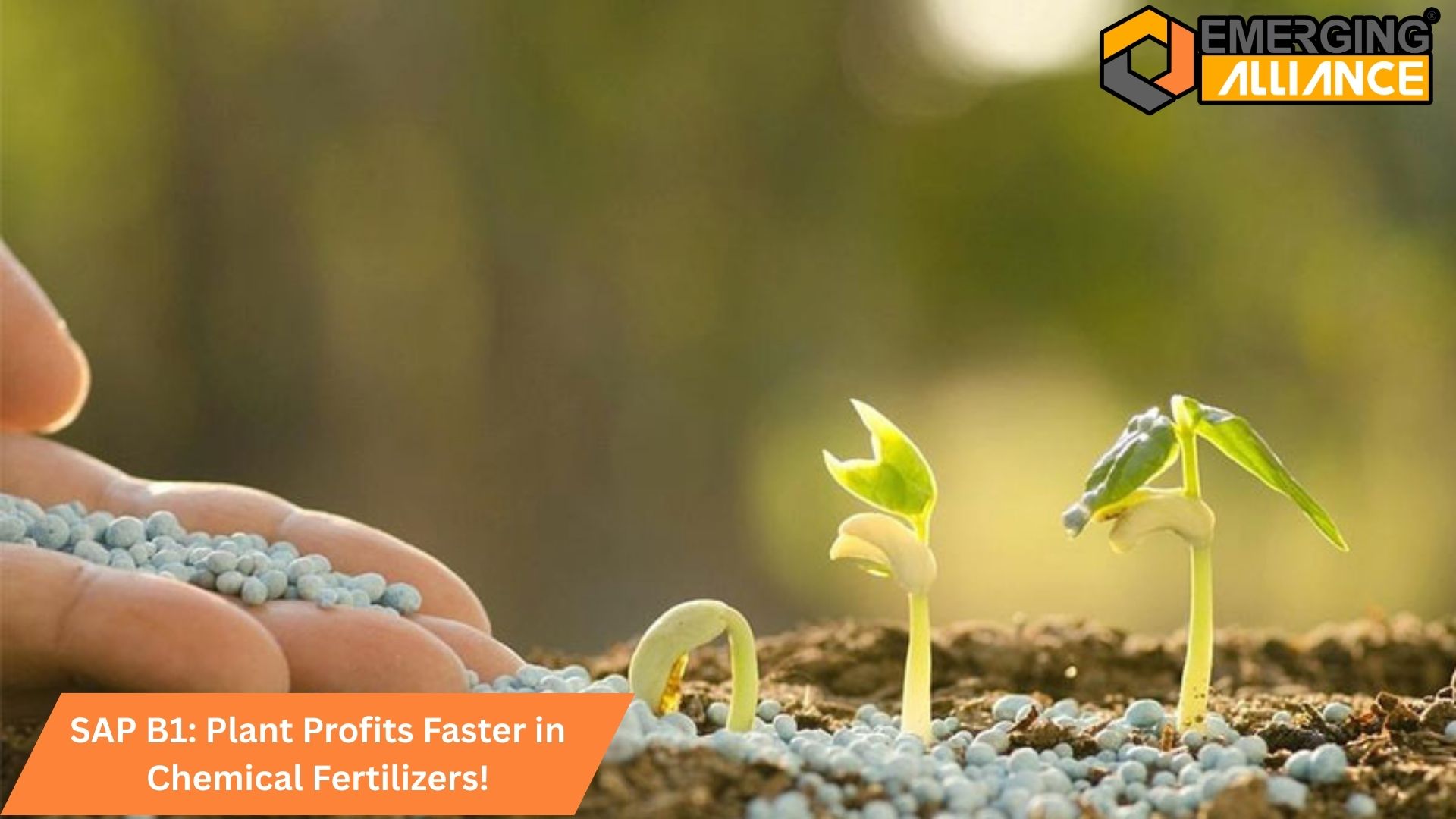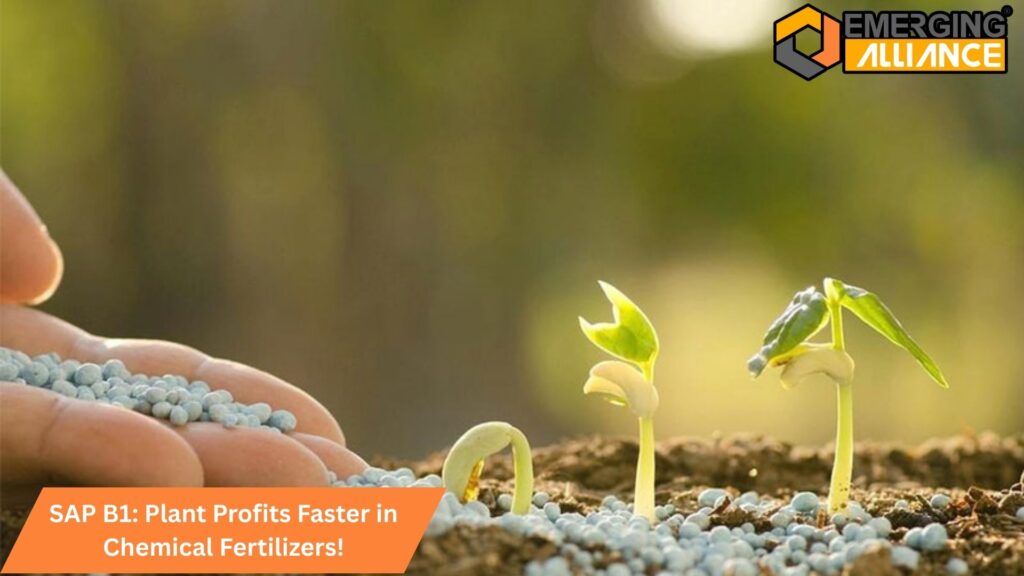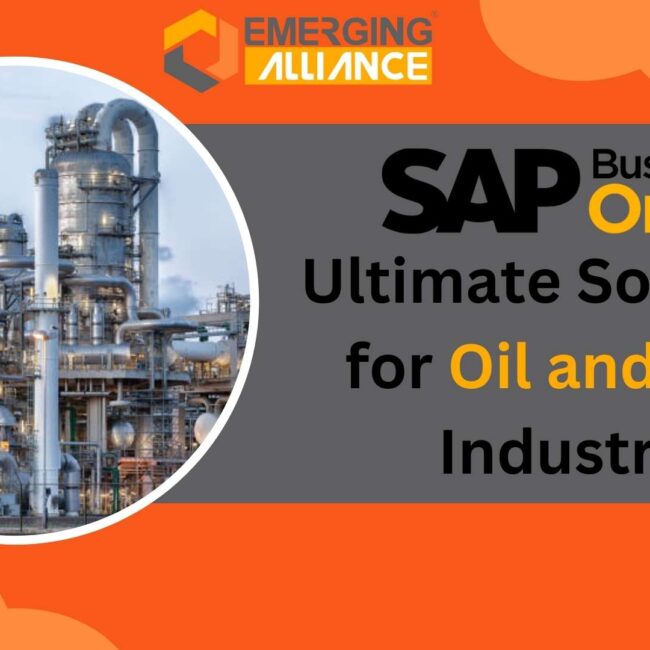
SAP B1: Plant Profits Faster in Chemical Fertilizers!

Reimagining Growth: How SAP Business One is Revolutionizing the Chemical Fertilizer Industry
In an industry where every compound matters and precision dictates success, chemical fertilizer companies face a unique set of operational challenges. From the volatility of raw material costs to tight environmental regulations, every step of production must be optimized. Enter SAP Business One (SAP B1) – a compact, intelligent ERP solution engineered to tackle complexity with clarity.
SAP B1 is more than an enterprise resource planner; it is the digital fertilizer for your business processes. Designed with the agility and specificity that the chemical fertilizer industry demands, it integrates finance, procurement, production, inventory, and compliance into one intelligent platform.
From Soil to Sale: Where SAP B1 Enriches Every Step
1. Procurement Precision: No More Overstocking or Shortages
Balancing supplier timelines and fluctuating chemical costs is a constant struggle. SAP Business One brings intelligent demand forecasting and vendor performance analysis into play. With automated purchase recommendations and supplier contract management, it ensures optimal sourcing and reduces unnecessary expenditure.
2. Formula Management that Mixes Science with Simplicity
Different regions, crops, and soil types require different formulations. SAP B1 enables granular control over Bill of Materials (BOM), allowing businesses to update, replicate, or revise formulas with traceable version control. This ensures every batch of chemical fertilizer meets precise standards without manual oversight.
3. Production That Runs Like Clockwork
Synchronize your production scheduling with sales forecasts, resource availability, and equipment capacity. SAP Business One automates the creation of work orders, tracks the consumption of raw materials in real-time, and allows seamless coordination between departments. Real-time dashboards keep plant managers informed and proactive.
4. Inventory Intelligence for Every Granule
Inventory mismanagement is costly in the chemical fertilizers business. SAP B1 goes beyond basic stock tracking. It offers serialization, lot tracking, and safety-level monitoring. You can manage hazardous goods with MSDS (Material Safety Data Sheet) integration and ensure FIFO/LIFO-based movements to reduce spoilage.
5. Compliance Without the Complexity
For a chemical fertilizer manufacturer, compliance can become a full-time task. SAP B1 simplifies this with built-in regulatory templates, automatic documentation for audits, and alerts for expiration or requalification. Whether you’re targeting local agricultural boards or global export regulations, SAP B1 has your back.
6. Sales & Customer Management on Fertile Ground
Streamlining B2B sales and dealer distribution is vital. SAP Business One provides a unified CRM module that helps you manage leads, automate pricing tiers, track bulk orders, and measure sales team performance. Personalized dashboards let your sales managers close deals faster.
7. End-to-End Visibility with Real-Time Reporting
No more waiting on month-end reports. SAP B1 delivers real-time analytics across every business unit. Whether it’s procurement cost variance, plant utilization rates, or margin contribution by product, you get deep insights that allow informed and confident decision-making.
Real Results: How SAP B1 Transforms Fertilizer Factories
Companies that implement SAP B1 within the chemical fertilizer sector have experienced measurable transformations:
- 40% faster order fulfillment due to integrated production and dispatch planning
- 35% reduction in raw material waste from accurate MRP and formulation control
- 30% improved forecasting accuracy, reducing stockouts and overproduction
- Increased profitability with real-time visibility into margin leakages
- Significant reduction in audit risks due to automated compliance tracking
The ROI of SAP B1 often becomes evident within 12 to 18 months of implementation.
Why the Chemical Fertilizer Industry Can’t Ignore SAP Business One
SAP Business One is purpose-built for industries that demand regulatory accuracy, production efficiency, and market responsiveness. For chemical fertilizers, it aligns perfectly with the unique needs of this niche sector. Here’s why:
- Cross-Functional Collaboration – Finance, production, R&D, and logistics operate on one data layer
- Scalability Without Complexity – Add new products, plants, or countries without IT overhauls
- Cloud or On-Premise Deployment – Flexible hosting to match your infrastructure needs
- Global Support – Whether you operate locally or export globally, SAP global support network keeps you covered
SAP B1 transforms reactive businesses into proactive, performance-driven powerhouses.
Looking Ahead: Cultivating a Future-Ready Fertilizer Business
The chemical fertilizer market is evolving. Sustainable sourcing, smarter farming, and digital integration are no longer trends—they are the future. With SAP Business One, you’re equipped not just to adapt but to lead.
As government policies become more stringent and global competition rises, agility becomes the biggest asset. SAP B1 allows companies to adjust quickly, innovate confidently, and grow responsibly.
Whether you’re a local manufacturer or a global supplier of chemical fertilizers, the message is clear: it’s time to plant the seeds of digital transformation with SAP Business One.
FAQs
1. How does SAP B1 improve demand forecasting for chemical fertilizers?
SAP B1 uses historical sales trends, seasonal patterns, and real-time analytics to forecast fertilizer demand more accurately.
2. Can SAP Business One manage hazardous chemical inventory?
Yes. SAP B1 supports classification, safety labeling, and expiration tracking for hazardous materials used in chemical fertilizers.
3. What makes SAP B1 better than generic ERP solutions for chemical fertilizers?
SAP B1 is tailored with features like formula management, batch traceability, and compliance tools, which are critical for the fertilizer industry.
4. Can I manage multiple fertilizer product lines with SAP B1?
Absolutely. SAP B1 allows for seamless multi-product tracking with unique BOMs (Bill of Materials) and cost centers.
5. How fast is the ROI after implementing SAP Business One in a fertilizer company?
Most companies report ROI within 12–18 months due to improved efficiency and reduced waste.
6. Is SAP B1 suitable for both manufacturing and distribution of chemical fertilizers?
Yes. SAP B1 offers end-to-end capabilities for both manufacturing and distribution processes.
7. Does SAP Business One help with export compliance in fertilizer trade?
Yes. SAP B1 helps manage export documentation, customs compliance, and tax calculations.
8. How customizable is SAP B1 for small fertilizer plants?
SAP B1 is modular and scalable, making it a great fit for small to mid-sized fertilizer manufacturers.
9. Can SAP B1 integrate with lab testing equipment for fertilizer quality checks?
Yes. SAP B1 allows integration with third-party lab systems for test result imports and analysis.
10. How does SAP B1 support sustainability in chemical fertilizer production?
SAP B1 helps track resource usage, monitor waste generation, and optimize energy consumption for eco-friendly operations.



